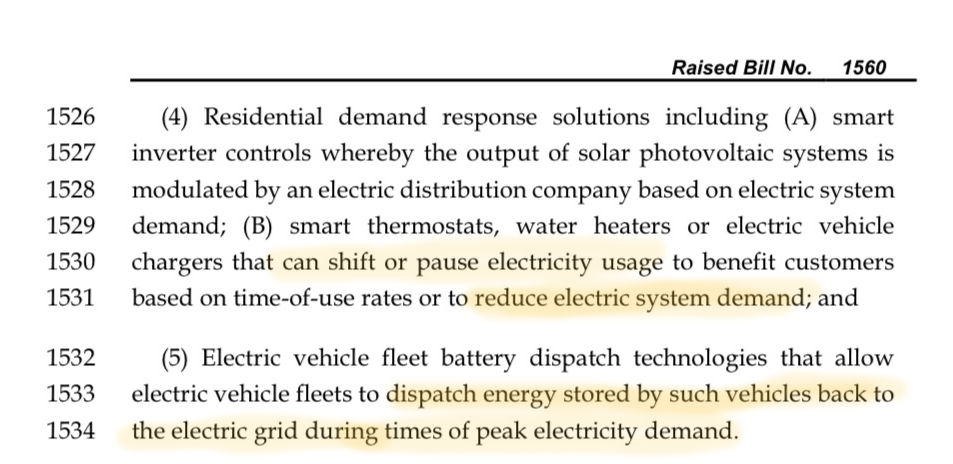Concerns Raised Over Senate Bill 1560 and Rising Energy Costs

Chris Herb, President and CEO of the Connecticut Energy Marketers Association (CEMA), recently spoke with radio host Paul Pacelli on WICC 600 AM about Senate Bill 1560 and other energy-related legislation under consideration this session in the Connecticut General Assembly. Herb warned that incentives promoting smart thermostats and heat pumps could drive up electric bills and reduce homeowners’ control over their indoor temperatures.
The conversation also touched on broader concerns about Connecticut’s push for electrification and the state’s already high energy costs. The legislative session concludes on June 4, 2025.
Note: Some content has been edited for clarity and brevity.

Your EV. Your Power. Their Control!
Page 50 of S.B. 1560 allows utilities to seize power from electric vehicle batteries and control your home’s electricity usage.
Chris Herb: There’s a bill that recently came out of the legislature’s finance committee that could allow utilities to control the temperature inside your home — lowering heat in the winter and raising air conditioning in the summer — in response to grid demand. When there’s not enough electricity, they want access. Senate Bill 1560, specifically Section 35, outlines this. Frankly, it’s concerning.
Paul: How are they doing this? Or how would they do this?
Chris Herb: They’re duping consumers/homeowners into installing smart meters and thermostat technologies that could allow utilities and the government to access and control the temperature of your home when the grid is at capacity. There’s $25 million in the appropriations budget to subsidize electric heat pumps for Connecticut residents, but those subsidies come with strings attached.
In order to get money from the government — taxpayer money, I might add— they make you install smart meters and thermostats into your house. Once you sign on the dotted line, you give the government/utilities the right to control these smart technologies in your home, and that’s how they get access.
So, they lure you in with an incentive of subsidy, once you bite, they got the fish on the hook. And now next thing you know, it’s 96 degrees out, 85% humidity, and they’re taking your air conditioning and they’re turning it up to 78 in response the grid at peak demand. And if you think that I’m spinning out some sort of conspiracy, look at what happened in Washington State! In response to an electric grid overload, utilities started adjusting the temperate in people’s private homes and the people could not override it.
Paul: I recently saw news reports out of Boston, Massachusetts, which addressed government incentives for people to switch to electric heat pumps without disclosing how much utility bills would increase by doing so.
Chris: Massachusetts offered incentives for switching to electric heat pumps, but many homeowners were shocked to discover their heating costs doubled — or more — during the winter.
And as you know, these heat pumps don’t only produce heat, they also produce air conditioning. So, these customers haven’t even experienced the cost of electricity to run them in the summer when the overall demand is much higher.
One of our concerns is that Connecticut has the highest electric rates in the country; this Boston news story is something that Governor Lamont should look at closely before he decides to sign any legislation that could dupe people into converting to electric heat pumps and incurring the outrageous electric costs that are associated with them.
Paul: So, Chris, what should people watch out for? Something online, something in their bill, or something in their paper bill? If this gets passed and then months down the road, what would they look for? What is the pitch?
Chris Herb: I would say this, use the good common sense your grandmother gave you, if it’s too good to be true, then it’s not a good deal. Check the details if you’re offered significant financial incentives for a heat pump. Will this allow the utility or the government or a third party to be able to adjust the temperature of your house in response to times when the grid is being overwhelmed by demand? And do your homework on how much it will actually cost to run these systems. If you think your electric bill is high now — just wait.
Footnote:
CEMA members install more electric heat pumps than anyone else in the state. While heat pumps offer several advantages, they don’t work for every home — particularly those without open floor plans or in areas with extremely cold temperatures.
If you have a heat pump, CEMA recommends a secondary heating and cooling source as a backup.
CEMA also opposes the use of taxpayer dollars as incentives that could ultimately drive-up electric bills and limit homeowners’ control over their own homes. The organization encourages informed decision-making, without manipulation or government influence.
